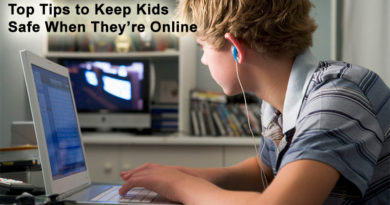Staying Safe Online: A Lesson For All Ages
What does safe online behavior look like? Answers will vary depending on who you ask, including everything from using antivirus software to setting social media accounts to private – but one thing everyone agrees on is the fact that the internet is a hazardous place, and staying safe means being proactive.

If you’re concerned about maintaining your privacy online, these four steps can help keep you safe, and similar rules apply at all ages. At a time when parents post sonograms online and tweens have their own social media accounts, internet education needs to take place early and often.
Limit Location Data
One tool that’s popular with social media users is the ability to tag locations when posting online so that everyone knows where you’re eating brunch or grabbing coffee with friends, and checking in can help support local businesses. Unfortunately, posting your location regularly on social media can also make you more vulnerable to both corporate and private surveillance. As cybersecurity expert and fellow with the Berkman Klein Center for Internet & Society Bruce Schneider explains, “Surveillance is the business model of the internet.”
Simply put, businesses collect and monetize all of your data, including your location, and when you decline to check-in and turn off location services on your phone, you make it harder for them to make your daily activities into a financial asset – but companies aren’t the only ones who care about your location. If you’ve ever been targeted by a stalker, for example, your harasser may use your social media check-ins to track you down. If you really want to check-in on social media, wait until after you’ve departed to post that update.
Read All The Rules
Any time you download an app, you’re given access to a long, confusing document known as the Terms of Service, and the fact is, no one ever reads them. Well, it’s time to start. Particularly when choosing apps for your children to use, take the time to assess the Terms of Service Agreement so that you understand what data the app is accessing and what it’s doing with that data. You may not understand all the details, but once you know what information the app collects, you can decide if you want your child using it and you may even be able to opt out of certain parts of the program.
Emphasize The Social
The majority of teens today are on social media, and because they’ve grown up on these sites, teens are trying their best to use them responsibly; 60% of teens Facebook users have private profiles and most understand the sites better than their parents, even if they don’t have the best judgment. So while you can’t keep your kids off of social media – it’s a central part of most young people’s social lives today – you can talk to them about what it means to have a public presence online, and that starts by making it clear that your teen’s online activity is under your surveillance.
Checking up on your teen’s social media activity doesn’t mean that you don’t trust them, but you may have a hard time getting your children to believe that. That’s why it’s important that you underscore that you don’t trust other people online and you’re monitoring their accounts for safety purposes – and then stick to that. You can talk to your teen about what information is appropriate to post online, help them develop better judgment, and, most importantly, look at who their contacts are. Your primary goal should be to make sure they aren’t accepting requests from predators or responding to messages from strangers.
Keep The Conversation Going
Remember, if you have kids, they likely encounter information online privacy, discuss the topic with their friends, and have a nuanced understanding of behaviors like cyberbullying that have emerged with the technology – and that adults can’t understand in the same way – so keep the conversation going. As you provide decision-making guidance, you may also learn a few things about new app features, privacy settings, and other online concerns. Where once parents asked their kids to program the VCR, today young people are leaders on cybersecurity. Listen up.



